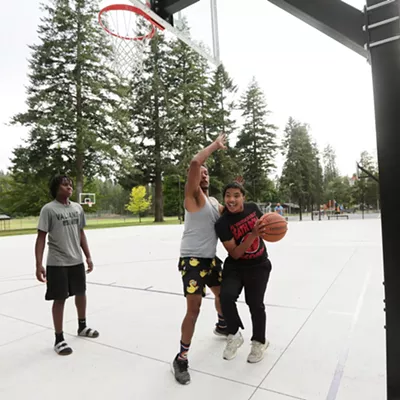The sex issue. As far as we’ve come as a species — landing on the moon, unlocking the secret of our own dna — sex still freaks us out. Yep, we’ve humped and pumped 7 billion people into the world, and yet some in the community will think us reckless for devoting a few pages to the taboo topic. We hope, however, our loyal readers might notice the restraint in what could be the least sexy sex issue ever (with modestly sized headlines and not a vibrator in sight). In the end, we believe openness breeds understanding, and that the benefit of such an issue is that it reminds us of an important fact about our own intimacy — we’re not alone, we’re human and the struggle is part of the experience. It’s funny how often we need to be reminded that, simply, we’re OK. Indeed, the brain is the largest sex organ. Send your feedback — criticism or compliments — to editor@inlander.com, and thanks for reading.
In the 1950s, TV producers gave us Lucy and Ricky — a typical married American couple, sleeping in separate beds. And the closest thing to erotica was your father’s hidden Playboy magazines. Some of us were told kissing could get you pregnant and touching yourself could lead to blindness.
But times have changed.
In the 1990s we watched Carrie Bradshaw of Sex and The City trade tips on sex with her gal pals. In the new millennium, Passion Parties replaced Tupperware parties. And Internet porn has become a thriving, billion-dollar industry. It’s reported that Americans now spend more money on porn than they do on all professional sports combined.
So it appears that we’re in the middle of a sexual renaissance, shaking off old attitudes and beliefs, and having discussions that would make our grandparents blush.
But progress is often one step forward, two steps back. In 2010, Tennessee passed a bill that prohibits public school students from such things as hugging and holding hands, because these were deemed “gateway sexual behaviors.” In that same year a survey revealed that 80 percent of college students didn’t think of oral sex as sex. And the words “clitoris” and “pleasure” are forbidden from use in many U.S. sex ed classes.
Zita Nickeson is a certified sex therapist in Spokane and has worked in the field of mental health for more than a decade. “We are more open in a general sense, but when it comes to our own sexuality, we still struggle,” says Nickeson. She agrees there’s more information available and we’re motivated to learn, but we’re stuck in the belief that sexual intelligence is innate. If we don’t know what to do, “we consider it a weakness or abnormal,” she says.
Experts say that in the pursuit of sexual intelligence, we’re struggling with other things: basic communication about our sexual needs and desires, the need to feel normal and a hyper focus on “the end result.”
WHAT IS SEXUAL INTELLIGENCE?
Marty Klein is a well-known author and sex therapist. He’s written six books about sexuality and speaks all over country. His goal, he says, is to help people feel sexually adequate and empowered, and support healthy sexual expression and exploration.
Klein says sexual intelligence is about knowing your body, your desires, your limitations, and your partner’s as well. It’s about the emotional skills that let you work with this information and foster awareness of your body and sex. In his latest book, Sexual Intelligence: What We Really Want From Sex and How to Get It, Klein says it’s important to know that your body and the sex you have will be different on different days.
Sexual intelligence has nothing to do with how physically capable you are or your familiarity with the Kama Sutra. Although Klein says he sees many patients who want to be better performers, this shouldn’t be the goal. Knowing where you and your partner like to be touched and kissed has far greater value.
“The point is to start tuning in to what you want and understanding that our sexuality goes far beyond penis/vagina intercourse,” says Klein. “It’s about body awareness. It’s about stripping away cultural norms.”
REPRESSION AND SHAME
Our sexual intelligence is shaped by many things — parents, teachers, friends, religion and the media, for starters. For many, sex and shame go hand in hand. Klein says shedding old beliefs and attitudes is a step in the right direction. But this is easier said than done. A 16-year-old may be more sexually intelligent than the average forty-something, he says, because of the shame factor. (However, teenagers are dealing with a new paradigm — massive exposure to sexuality via the Internet.)
Nickeson says we get stuck when we think our sexual intelligence is innate. “We believe we should just know what to do,” she says. And anything short of that is an ego-crusher. “We think we’re weak or abnormal.” The local sex therapist says it’s very difficult for people to accept help.
THE PURSUIT OF NORMAL
“We’re worried about what we like and what we need,” adds Nickeson. “Is what I like OK? Is it different from everybody else?”
Normalcy anxiety plagues people. Klein and Nickeson say most clients come to them to hear that their bodies and desires are normal. We literally worry about the nuts and bolts of our sexuality, Klein adds.
“Americans are concerned — virtually obsessed — with the normality of their sexual fantasies, preferences, responses, frequency, turn-offs, problems and bodies,” says Klein. “The fear of being sexually abnormal interferes with, and even prevents, pleasure and intimacy.”
“People want to know if what feels good to them is normal,” adds Nickeson. Despite the fact humans come in different packages, we often think of sex as one-size-fits-all. And people are intimidated by what they perceive as their differences. “The point is to start tuning in to what you want,” says Klein.
MYTH AND (S)EXPECTATIONS
Often what trips us up is pure myth, Klein says. For example, many people are under the mistaken impression that anyone interested in bondage or submission must have come from a background of abuse. But in fact, people who include BDSM in their sexual repertoire are no more likely to have experienced abuse than those who do not.
We also struggle with ideas and expectations about sex — that we should always “feel in love”; that sex should be spontaneous instead of planned; that we have to be good performers. These concepts can create suffering. “My advice is that you simply let it go,” says Klein. The sooner you do, the sooner you can move onto the sex you’re supposed to have, rather than the sex you’re driving yourself crazy to have.
WORDS AND BOUNDARIES
Nickeson considers people sexually “well-rounded” when they are aware of their bodies, know what they like and then communicate that information. But how do you tell your partner you’d like something when you can’t even say the words?
“We need a vocabulary,” says Klein. “If you and I are cooking in the kitchen together, preparing a meal, and can’t use the names of the ingredients — or words like ‘chop,’ ‘broil,’ ‘steam’ — it’s going to be very difficult to make this meal.”
But what about those struggling to get outside their verbal comfort zones? What about slang? “If you’re uncomfortable with using the given names, saying, ‘I’d like to visit your scented rose garden’ is preferable to ‘down there,’” Klein advises. In addition to developing a working vocab, Klein and Nickeson both emphasize developing a rapport with your partner that includes talking openly, but also being honest and setting boundaries.
OUR CHANGING BODIES
“Many [pursue] sex not primarily for pleasure, but to push away loneliness, to feel youthful or special, to remember who they are in the unrelenting face of a pitiless aging process,” Klein says.
Sometimes we use sex, he adds, for the conclusion reached by many wise philosophers who arrived long before sex therapy: We fear our demise. But his larger message is that we simply acknowledge that our bodies change, and not just when we’re going through puberty in junior high — but all throughout our lives. He reminds us that during our life span, our bodies will be at their sexual “best” for one or two decades, at most.
We change and so does sex, say the experts. When we understand our bodies, emotions and desires, we become more effective communicators and therefore more sexually intelligent. And in the process, the focus shifts to the journey instead of the destination.















